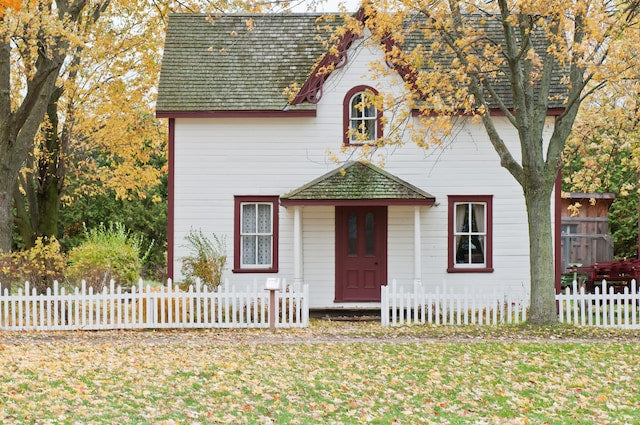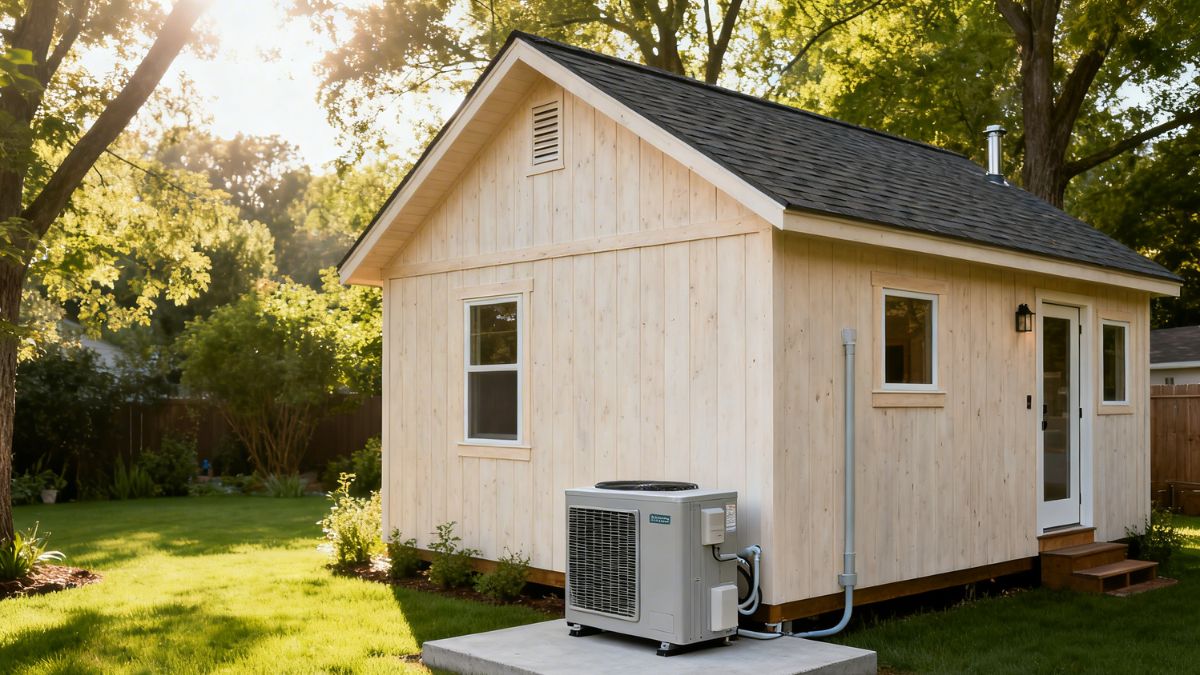Photo by Scott Webb on Unsplash
Tiny homes epitomize minimalist and sustainable living. These compact havens challenge us to innovate, optimizing limited space. Beyond the home itself, the surrounding space, even if small, is essential. Enter fencing. More than mere boundaries, fences can be versatile allies for tiny home dwellers. Here are 25 ways to weave fencing into the fabric of tiny home living:
1. Privacy Screen
A strategically placed privacy fencing acts as a visual barrier, ensuring residents have their private oasis, away from prying eyes in populated regions.
2. Vertical Gardening
Maximize your vertical real estate. Use fences to hang planters filled with flowers, green vines, or even your favorite herbs, turning them into lush vertical gardens.
3. Extend Living Spaces
Consider the fence as an outer wall, marking outdoor spaces such as tiny patios or deck areas, creating an illusion of a more spacious living area.
4. Aesthetic Appeal
With decorative or painted fencing, you can boost the exterior design and vibe of your home, making it both functional and beautiful.
5. Security
Sturdy, tall fences act as deterrents for intruders, adding an extra layer of security to your tiny abode.
6. Pet Safety
For pet owners, fences can be a godsend. They delineate play areas, ensuring your furry friends have space to roam without wandering off.
7. Noise Buffer
A tall, dense fence can insulate against external noises. If your tiny home is close to high-traffic zones, such a fence can offer a quieter environment.
8. Tool Storage
Instead of cluttering your limited indoor space, use hooks to hang gardening tools or outdoor equipment on the fence.
9. Energy Efficiency
By casting shadows, strategic fencing can provide shade and reduce the home's exposure to direct sunlight, lowering cooling needs.
10. Windbreaker
In areas with strong winds, a solid fence acts as a buffer, protecting your home and any outdoor setups.
11. Drive or Pathway Marker
Especially in communal tiny home settings, fences can mark individual pathways or drives, offering clear demarcations.
12. Rainwater Collection
By attaching gutters, fences can channel rainwater into storage units, making water available for gardening.
13. Outdoor Art Display
Celebrate creativity by using the fence as a canvas. Whether it's murals, framed artwork, or family photos, fences can double as outdoor galleries.
14. Children's Play Area
Safety first. A fenced zone can provide children a secure play area, incorporating features like chalkboard walls or interactive play modules.
15. Pergola Integration
Marry fences with pergolas, resulting in ornate shaded spots, perfect for an afternoon read or relaxation.
16. Outdoor Lighting
To add ambiance or simply light up the night, integrate solar lights, fairy lights, or lanterns into your fence design.
17. Composting Zone
Promote sustainability. Use fencing to earmark and enclose a composting section, turning kitchen waste into garden gold.
18. Recycling and Trash Storage
Maintain your home's pristine exterior by using fences to conceal bins, ensuring the environment stays organized.
19. Outdoor Shower
Fences can encircle an outdoor shower, giving you the luxury of bathing under the open sky while ensuring privacy.
20. BBQ or Cooking Zone
Fences can safely mark out a zone for outdoor cooking, whether it's summer barbecues or campfire cookouts.

21. Greenhouse Area
Combine fencing with clear panels to craft a mini-greenhouse or potting shed, giving you a jumpstart on the gardening season.
22. Clothes Drying
Harness nature's dryer. String lines between fence posts, letting your clothes dry with a fresh outdoor scent.
23. Bird and Wildlife Watching
Infuse life into fences by adding birdhouses or squirrel feeders, turning your yard into a mini wildlife observatory.
24. Seasonal Decor
Whether it's twinkling lights during holidays or festive banners, fences can be the stage for seasonal displays.
25. Expandable Workspace
A fence can accommodate a foldable table or workbench. When not in use, fold it back up, ensuring functionality without compromising space.
The Fusion of Fencing and Tiny Home Living: A Deep Dive
The burgeoning tiny home movement isn't just about downsizing one's living space; it's a comprehensive redefinition of what constitutes a home and how every inch of space can be optimized. As the essence of these homes revolves around the art of making the most of the minimal, external factors like fencing become more than an accessory—they are integral.
The Philosophical Connect
Firstly, the tiny home movement is steeped in the philosophy of minimalism and sustainability. It's about letting go of excesses and living with intention. The purpose is to ensure every piece of furniture, every utility, and even every fence has a purpose.
Fencing around a tiny home mirrors this very sentiment. It's not just about boundary demarcation; it's about functional utilization of space, fostering a connection with nature, and asserting one's individuality.
Fencing as a Space Multiplier
The perception of space is as psychological as it is physical. When you have a fence around your tiny home, it psychologically amplifies the sense of ownership and space. You don't just own the few square feet inside your tiny house; you own the exterior realm as well. This fencing provides an aura of spaciousness.
For instance, consider stepping out of your tiny home into an open area versus a fenced-in yard. The latter offers a sense of containment and security, a private cocoon where the world feels both expansive and intimate simultaneously.
Marrying Form and Function
Modern fencing solutions for tiny homes have dramatically evolved. They are no longer about erecting wooden or metal barriers. Homeowners have the luxury of exploring eco-friendly materials like bamboo, recycled wood, or even living fences made of shrubs.
Some integrate storage solutions within the fence structure—small alcoves or pockets that can hold garden tools or outdoor gear. Others opt for modular fences that can be rearranged based on needs, be it to accommodate more guests or change the layout of the outdoor space.
Fostering Community
For many, tiny home living isn't a solitary endeavor. Tiny home communities are sprouting up across various regions, offering a blend of privacy and community living. In such setups, fencing plays a pivotal role in delineating personal space while fostering a sense of community. By using semi-permeable fencing or integrating small gates, neighbors can choose between solitude and sociability. It’s about creating boundaries without building walls.
Bridging Indoors and Outdoors
One of the charms of tiny home living is its ability to blur the lines between the interior and exterior. With limited indoor space, the outdoors often becomes an extended living room, kitchen, or even bedroom on pleasant days. A strategically designed fence accentuates this seamless flow. Imagine a fence with integrated seating, or one that supports a fold-out table. The fence becomes an extension of the tiny home's wall, offering both utility and aesthetics. You can always rely on fence installation in Adelaide or other local regions to help bring about the best fence possible for your tiny home.
Conclusion: The Future of Tiny Home Fencing
As the tiny home trend continues its upward trajectory, the role of fencing in enhancing the living experience will be magnified. We're on the cusp of seeing innovative fencing solutions that cater specifically to the needs and aspirations of tiny home dwellers.
From smart fences embedded with sensors that aid in security and maintenance to sustainable solutions that have a minimal carbon footprint, the future is promising.
With the right approach, fencing can encapsulate the essence of tiny home living—functional, sustainable, and profoundly personal. It's about crafting spaces that resonate with individual preferences while being in harmony with the environment. As the boundaries of traditional living continue to be redefined, fences around tiny homes will stand as testaments to ingenious design, creativity, and a deep-rooted connection with the earth.






Share: